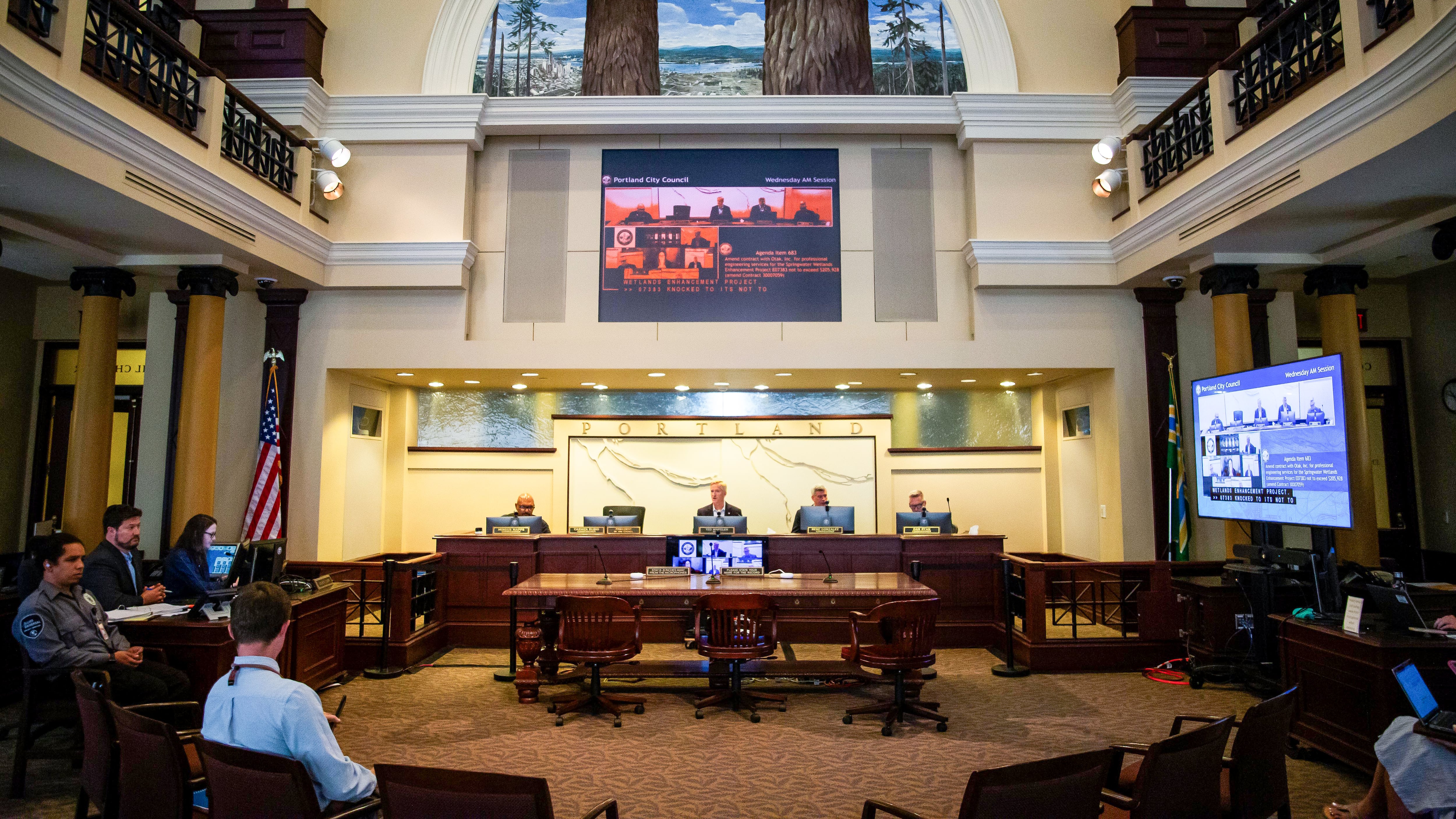As the city of Portland approaches a massive overhaul of its structure and governance that voters approved for 2025, Mayor Ted Wheeler and his City Council colleagues are clashing over critical parts of the 15-month transition ahead—including the renovation of City Hall.
In an exchange of letters during the past week, Wheeler sparred with his council colleagues Carmen Rubio, Dan Ryan and Rene Gonzalez over four distinct issues relating to future City Council staffing, the scale of middle management, how the 26 city bureaus are arranged, and the physical expansion of City Hall that’s likely to cost a pretty penny.
Nearly all the sticking points boil down to two factors: money and power. The money part is obvious, since nearly every point of dispute comes with a price tag. The power struggle is more subtle: Wheeler, who isn’t seeking reelection, has made overseeing the new structure a cornerstone of his legacy, while his colleagues are all eyeing his office and expect to govern whatever he builds.
The three city commissioners’ offices—all except that of Commissioner Mingus Mapps, who says he’s provided alternative feedback—wrote in a drafted letter to the mayor, obtained by WW this week, that they felt sidelined during the reorganization process undertaken by chief administrative officer Michael Jordan, who works under Wheeler. “Simply put: how we finish the commission form of government also matters,” the three council offices wrote. “Our argument is that this should and must be a truly collective endeavor.”
In a statement to WW, Wheeler said: “This transition is not about us, this is about the community. We have an obligation to implement these changes by Jan. 1, 2025, and hope that the elected offices can lead by example in this change management process and do what is necessary to adequately pressure test the new structure prior to the start date.”
In a Tuesday work session amongst the five city leaders, little was resolved. Commissioners exchanged jabs, with commissioners Gonzalez and Ryan in particular complaining that they’ve been left in the dark during this whole process.
Here are the main disputes:
CITY HALL RENOVATION
To accommodate the new, 12-member council, City Hall must undergo a costly renovation. The city has budgeted up to $7.2 million for that revamp, but there’s tension over when to begin the renovation—and where the current commissioners’ offices should relocate in the meantime.
What Wheeler proposed: The mayor put three options in front of his colleagues to house the current council offices while City Hall is being renovated. All three would cost money, Wheeler wrote. The first two scenarios, costing between $893,000 and $1.4 million, would require commissioners to relocate to another city-owned building nearby. A third option—one Wheeler opposes—is to delay construction until 2025, at a cost of $2.1 million. “Given the financial and future service impacts of delaying construction, the best course is to commence construction at the beginning of 2024,” Wheeler wrote in a Sept. 26 letter.
What Rubio, Gonzalez and Ryan want: To delay the City Hall renovation until 2025.
DEPUTY CITY ADMINISTRATORS
A central feature of the new government is that day-to-day city functions and all bureaus will be overseen by a professional city administrator with management expertise. To do that, however, the city administrator will need deputies.
What Wheeler proposed: Jordan proposed an assistant city administrator and five deputies who would each oversee clusters of bureaus split up into service areas, like utilities, which would include the Water, Transportation and Environmental Services bureaus.
What Rubio, Gonzalez and Ryan want: Only three deputies, because they’re worried that having five could cost over $3 million.
A SIXTH BUREAU CLUSTER
In preparation for the new government, Wheeler clustered the city bureaus at the beginning of 2023 into five distinct “service areas.” For instance, Rubio would oversee the economic development cluster, including the Housing Bureau, the permitting Bureau of Development Services, and the city’s economic development arm, Prosper Portland.
What Wheeler proposed: The city has five clusters of bureaus already in place.
What Rubio, Gonzalez and Ryan want: They’re seeking a sixth cluster that includes Portland Parks & Recreation, a future City Arts Office, a planned Natural Resources division (managing the city’s natural areas), and the Portland Children’s Levy.
CITY COUNCIL STAFF
What Wheeler proposed: According to a draft staffing model for the 12-member City Council distributed to the current commissioners, each of the 12 future councilors would have two aides as well as shared staff.
What Rubio, Gonzalez and Ryan want: They hope to start the 12 City Council offices with just one staffer apiece, plus administrative staff to serve all offices. “The cost difference we were presented drove this decision,” the commissioners wrote Sept. 28. “If the future council finds new revenue for larger teams, that is within their purview.”

